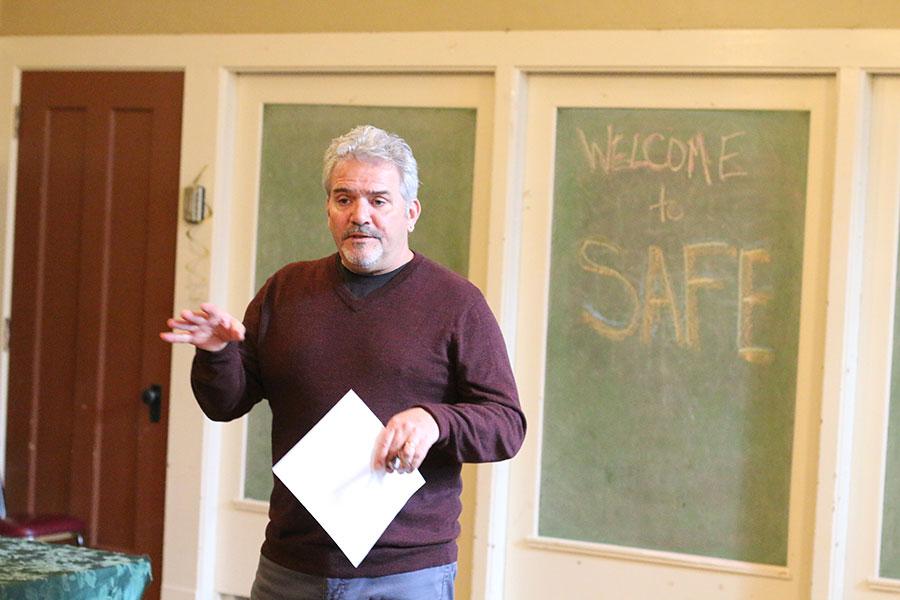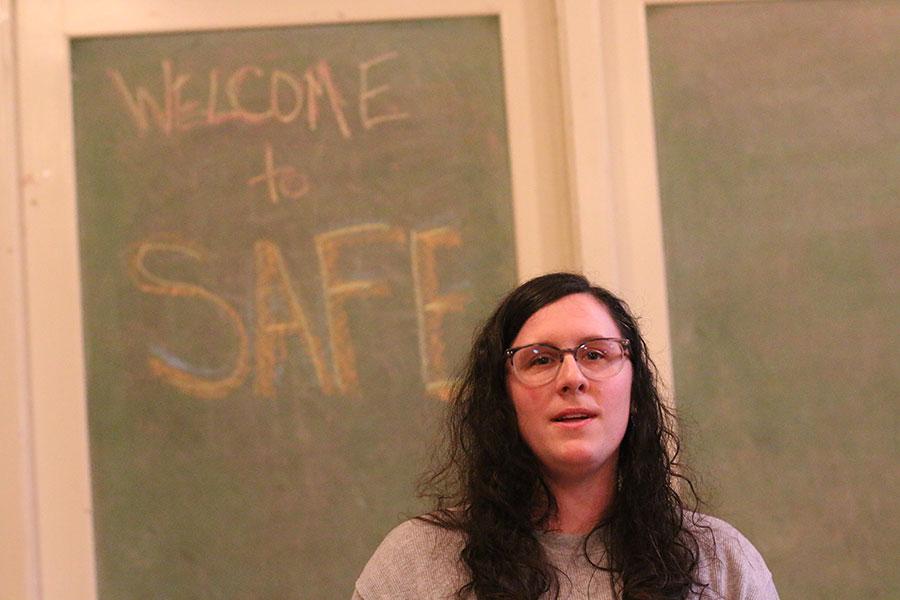|
Narcissism a hallmark of religious abusers
By Ed Langlois
Catholic Sentinel
October 11, 2019
https://bit.ly/2M75Leu
 |
| Rev. Ken Garrett, pastor of Grace Church in Southwest Portland, escaped an abusive pastor two decades ago. He began a support group for those who have suffered spiritual abuse. |
 |
| Jennifer Olajuyin discusses how she escaped a manipulative Southeast Portland church to which she had belonged since she was a child. The pastor spent time in prison for sexual abuse. |
It’s a Friday evening at Kennedy School, a pub in Northeast Portland. Revelers lift their glasses and guffaw.
But in a quiet back room, two dozen spiritually serious people have gathered quietly. They are grappling with the feeling that they have been manipulated and conned by leaders they saw as conduits to God.
The Spiritual Abuse Forum for Education, SAFE, is a Portland-area support group for those who have suffered mind control, financial swindling and overbearing manipulation by religious leaders.
In the Kennedy School crowd, mostly made up of people in their 30s and 40s, is Julie Anne Smith. A former Catholic, Smith began speaking out about what she saw as spiritual abuse at Beaverton Grace Bible Church.
In 2008, when a church employee was fired, Smith confronted the pastor because she felt the dismissal was unjust. The pastor responded by ordering Smith to recant her complaints, which did not sit well with her. Smith left the church and began posting Google reviews about what she saw as abuse, including alleged sexual assault. She called the church “creepy” and unsafe.
The enraged pastor sued Smith and others for defamation, but the lawsuit was thrown out.
Personality disorders
On this night at Kennedy School, the group is hearing from Kent Burtner, a local expert on spiritual grifters who says Smith’s story is typical in many ways. Burtner, a former Dominican friar, spent years leading Portland’s Cult Resource Center and still counsels people who have escaped abusive religious movements.
“In these groups, your mind and choices are abused, relationships are abused, finances are abused,” said Burtner, who attends St. James Church in Molalla and St. Therese Church in Northeast Portland.
Many abusive faith groups now don’t look like the large cults of the 1970s and 1980s, but instead are small fringe churches with pastors who are accountable to no one.
Burtner, a counselor who helped more than 1,000 people affected by religious abuse, said the manipulative movements usually are the result of narcissism in leadership. Jonestown, where 918 people committed suicide in 1978 at the behest of their spiritual leader, is an extreme example, but mind control happens in smaller ways all the time in churches, Burtner said.
Abusive leaders often start by controlling communication. Burtner reminded listeners that Bhagwan Shree Rajneesh, a cult leader in the 1980s in north central Oregon, blocked newspapers from coming to members.
“These leaders want to be the only source of information,” Burtner said. “They might even say media is evil.”
If members have challenging questions or doubts, leaders deflect the inquiries repeatedly until no one asks anymore.
Some abusive pastors even try to close down anger or other emotions. Burtner calls this “the ultimate dehumanization.”
By contrast, doubt and questions are welcomed in legitimate religions like mainline Catholicism. Medieval theologians in Catholic Europe, Burtner told listeners, insisted that doubt was acceptable because it got the Christian thinking.
The problem with abusive religious movements is not really about theology, but about the leader’s personality disorder, Burtner said. What’s more, abusive religious leaders often manipulate theology to validate the abuse. That, says Burtner, leaves church members not knowing what is real.
Burtner called his study of abusive religions “a vision of hell.”
“Church abuse happens when a religious leader uses his or her spiritual position to control, manipulate or dominate a person or group of persons,” said Ronald Enroth, a retired professor of sociology at Westmont College in Santa Barbara, California. Enroth spent decades studying manipulative religious movements. In his past two books, he turned his attention to abusive sects that claim to be within the sphere of Christianity.
“The leaders of these groups employ control-oriented autocratic leadership,” Enroth said. “I’m not saying they do it insincerely but they use their position as prophet, pastor, elder, priest or whatever they may call themselves to manipulate and control people’s lives. It is spiritual intimidation.”
‘The meat grinder’
The Rev. Ken Garrett, an evangelical pastor, began the SAFE support group, which meets monthly. “It’s mostly to provide information,” said Garrett, who wrote a dissertation on spiritual abuse. “We are not a fix-it group. We are filling toolboxes for people.”
Garrett, pastor of Grace Church in Southwest Portland, says about 3% of people in churches have had experiences with leaders inappropriately controlling their sexual behavior, their money, their interpretation of Scripture or whom they befriend and marry.
“There is a tremendous amount of abuse that goes on in Christian organizations,” said Garrett.
Most abusive churches are small, but the leader feels elite. Garrett recalls one pastor who, before he strode out to preach each Sunday, ordered an aide to kneel and tie his expensive shoes.
Garrett, a former Army paratrooper, himself spent a dozen years in the grip of a manipulative pastor at what was then called the Southeast Bible Church in Portland.
“It really ran me and my family through the meat grinder,” Garrett said of the experience, which he escaped 20 years ago. “In a lot of ways, we are still recovering.”
Pastor Michael Sperou, who spent time in the Oregon State Penitentiary for sexually abusing children, sought to manipulate the Southeast Bible Church congregation in many ways, Garrett said. In a 2015 trial for abuse, it emerged that Sperou required church members to give him money. For his 40th birthday, for example, he demanded that the church collect $4,000 for him.
“We see with these guys a deep hunger for affirmation,” Garrett said. “When they don’t get the praise, they’re happy to settle for people fearing them.”
‘I don’t know that I can ever be repaired’
Even as criminal conviction for Sperou neared, dozens of church members came to court to support him and denounce witnesses like Garrett.
Jennifer Olajuyin, one of seven women who said she was abused by Sperou when she was a girl, was disowned by her parents.
When Olajuyin was 4, her family joined Southeast Bible Church. The little community seemed ideal at first — a cluster of houses with a shared yard and a trampoline, with plenty of children.
But Olajuyin said Sperou was a narcissist who kept shifting the rules. Once, he gave teenage Olajuyin $20 as a gift then publicly shamed her for spending it on pizza instead of on gifts for other people. He told her there was no room in the community for individual needs and wants. Olajuyin, by nature an introvert, was forced constantly to mingle in big groups and suffered. When she sought solitude in her room, Sperou had the door taken off its hinges.
“There was constant judgment, criticism of what you were doing,” Olajuyin said.
Sperou told Olajuyin she was sinful to her core and selfish and could not trust her own thoughts and feelings. He ordered her not to date outside the church community.
Olajuyin knew she was supposed to be in awe of the man’s every word, but his preaching bored her.
She stayed until she was 21, when the problems became clear to her, including the leader’s sexual abuse of girls. Olajuyin, now 36, refused to give details but was part of a suit alleging abuse.
Even with all the pain, it was difficult to exit.
“I felt like I didn’t have an identity when I came out,” Olajuyin said. “I don’t know that I can ever be repaired.”
She is no longer religious.
To get what they want
“Spiritual abuse is a horrific way of manipulation and deceit,” Garrett said during the SAFE meeting. “They want to get something — money, sex, power. It’s pretty brutal. We always walk out of abuse with shame,” Garrett said.
The SAFE group has grown since Garrett posted it on meetup.com. About 30 people come on a usual evening and range in age from the 20s to the 60s.
One woman in the crowd on this night piped up about her own memory: “For us, it was our church or no church at all.” She choked up and reached for the comforting hand of her husband.
A man in the audience said that abusive religious leaders see people who are “all in” and target them for easy manipulation.
People in such communities can fall into a trance and begin to believe in the leader’s self-proclaimed powers, said Garrett, who refused job promotions to please his pastor. Then Sperou rebuffed Garrett’s attempts to strike out on his own as a pastor.
Abusive leaders tend to be anxious, envious, defensive and temperamental, Garrett said. “These leaders don’t feel what other people are feeling. They are performing to get what they want.”
Perceived persecution is a defining characteristic of those who lead manipulative religious groups, said Enroth. “They think the rest of the world, including pointy-headed professors like me, are out to get them.”
|

